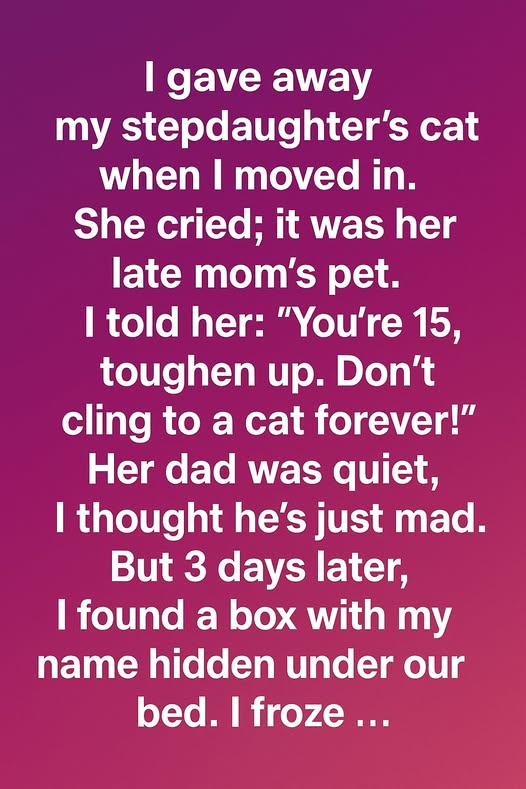I gave away my stepdaughter’s cat the moment I moved in. She cried; it was her late mom’s beloved pet, a constant companion that reminded her of moments she could never get back. I remember thinking I needed to assert some authority, to make it clear that I was part of this household now. “You’re 15, toughen up,” I said with what I thought was firmness. “Don’t cling to a cat forever!” Her dad stayed quiet in the background; I assumed he was upset with me, maybe agreeing silently with her outrage. I went about unpacking, trying to settle into our new life, but the tension hung thickly in the air.
Three days later, I discovered a box with my name scrawled on it, tucked carefully under the bed in Lily’s room. I froze, heart hammering in my chest, imagining what might be inside. Revenge? Anger? Something cruel meant to make me regret my hasty decision? Slowly, I lifted the lid. What I found instead brought a lump to my throat. It wasn’t anger or malice at all.
Inside the box was a small, carefully crafted scrapbook, its pages pristine and waiting, along with a handwritten note taped to the first page. It read: “A fresh start for us. Let’s build new memories.” Next to it lay a simple bracelet charm shaped like a heart, delicately tagged: “From Lily.” The gesture hit me harder than any anger could have. In my rush to force change and to assert myself in a new family, I had completely overlooked the love, memories, and attachments that already existed here. I sank onto the edge of the bed, holding the bracelet, my chest tightening as I remembered Lily’s tear-filled eyes the day the cat had left.
She hadn’t just lost a pet—she had lost a living connection to her mother, a daily reminder of a bond she couldn’t replace. And I, in my impatience, had tried to erase a piece of that history without understanding the depth of its meaning. The quiet knock of her dad entering the room startled me out of my thoughts. He didn’t scold or chastise me. He simply looked at me, sadness in his eyes, but also a gentle understanding. Before he could say anything, I whispered, “I made a terrible mistake.” He nodded slowly, his voice soft but steady: “What matters now is how you fix it.”
That evening, Lily walked in to find me sitting on her bed with the scrapbook open in my lap and the bracelet held carefully in my hands. I looked up at her and apologized, not defensively, not out of guilt, but with the raw honesty that comes from realizing you’ve hurt someone unintentionally. “I didn’t understand how much he meant to you,” I said, my voice barely above a whisper. “I thought being strict and enforcing rules meant being strong, but real strength is kindness. It’s understanding the hearts of those we love.”
I showed her the scrapbook and asked if she would fill the first page with me, starting fresh together. She hesitated, her eyes wide, unsure if she could trust me yet. Then, slowly, almost imperceptibly, she nodded. That tiny gesture felt monumental. It was the first real bridge I had built between her world and mine.
The very next morning, I set about making things right. I called shelters, checked with neighbors, and finally found the cat. Arrangements were made, and when Lily saw him again, she ran forward and hugged him tightly, tears streaming down her face—but this time they were tears of relief, not grief. She glanced at me, her eyes softening, a fragile trust forming where once there had only been anger. It wasn’t complete forgiveness, not yet, but it was a start.
That day, I learned a lesson I will never forget: families aren’t built by removing what came before, or by erasing the memories of those we love—they grow when we take the time to understand, respect, and embrace the hearts that already exist. The scrapbook, the bracelet, the cat—they weren’t just tokens. They were symbols of connection, of patience, and of the fragile, beautiful process of becoming a real family. And for the first time, I understood what it truly meant to join one.
